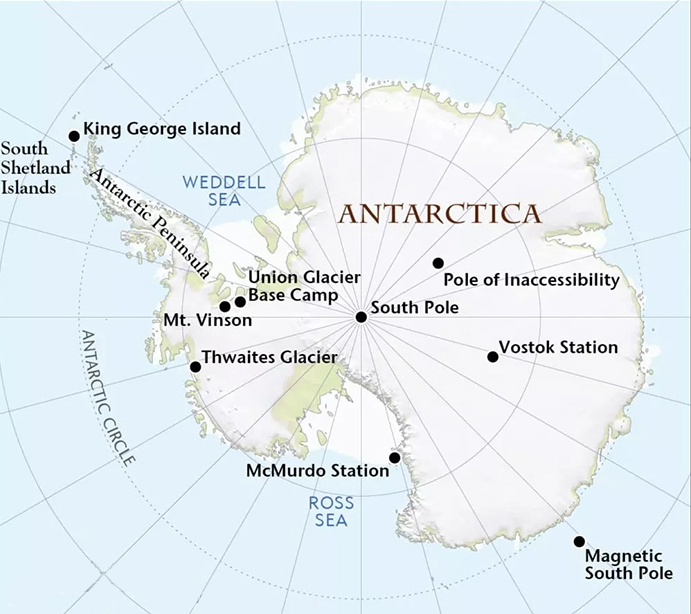Biodiversity & Environment
Draft Indian Antarctic Bill 2022
- 02 Apr 2022
- 6 min read
For Prelims: Draft Indian Antarctic Bill-2022, Marine Protected Areas (MPAs), Antarctica Treaty, Convention on the Conservation of Antarctic Marine Living Resources and the Commission for Conservation of Antarctic Marine Living Resources.
For Mains: India’s interest in Antarctica Region, Environmental Pollution & Degradation.
Why in News?
Recently, the government has introduced the ‘Antarctic Bill’ in the Lok Sabha, which envisages regulating visits and activities to Antarctica as well potential disputes that may arise among those present on the continent.
- The Bill is applicable to Indian citizens as well as foreign citizens.
- In October 2021, India extended its support for protecting the Antarctic environment and for co-sponsoring the proposal of the European Union for designating East Antarctica and the Weddell Sea as Marine Protected Areas (MPAs).
- Earlier, a 100-km long body of ice in Antarctica, which has been experiencing rapid melting, was formally named Glasgow after the Glasgow climate summit.
What are the Provisions under the Bill?
- Regulate Visiting:
- The bill has listed strict guidelines and a system of permits, which will be issued by a government-appointed committee, without which any expedition or individual will not be allowed to enter Antarctica.
- The bill has provision to establish a committee on Antarctic governance and environmental protection to monitor, implement and ensure compliance with the relevant international laws, emissions standards and rules of protection.
- The bill has listed strict guidelines and a system of permits, which will be issued by a government-appointed committee, without which any expedition or individual will not be allowed to enter Antarctica.
- Protecting Mineral Resources:
- The Bill further prohibits drilling, dredging, excavation or collection of mineral resources or even doing anything to identify where such mineral deposits occur.
- The only exception is for scientific research with a permit.
- The Bill further prohibits drilling, dredging, excavation or collection of mineral resources or even doing anything to identify where such mineral deposits occur.
- Protecting Native Plants:
- There will be strict prohibition on damaging native plants, flying or landing helicopters or operating vessels that could disturb birds and seals, using firearms that could disturb the birds and animals, remove soil or any biological material native to Antarctica, engage in any activity that could adversely change the habitat of birds and animals, or harm them.
- Prohibition on introducing Birds not Native to Antarctica:
- Introduction of animals, birds, plants or microscopic organisms that are not native to Antarctica are also prohibited.
- Violators can face imprisonment as well as penalties.
- Introduction of animals, birds, plants or microscopic organisms that are not native to Antarctica are also prohibited.
- Provisions for Indian Tour Operators:
- The Bill also provides for Indian tour operators to be able to operate in Antarctica after acquiring a permit.
- There are 40 permanent research stations in Antarctica of which two – Maitri and Bharati — are Indian.
What is the Objective of the Bill?
- To provide a harmonious policy framework for India’s Antarctic activities through a well-established legal mechanism, facilitate activities of the Indian Antarctic programme, including management of Antarctic tourism and sustainable development of fisheries.
What is the Need of Such Law?
- To Fulfill Provisions under the Antarctica Treaty:
- India had been a signatory to the Antarctica Treaty since 1983 and that encumbered India to specify a set of laws governing portions of the continent where it had its research bases.
- The Treaty made it mandatory for the 54 signatory countries to specify laws governing territories on which their stations are located.
- India had been a signatory to the Antarctica Treaty since 1983 and that encumbered India to specify a set of laws governing portions of the continent where it had its research bases.
- Preserve the Pristine Nature of the Continent:
- India is also signatory to treaties such as the Convention on the Conservation of Antarctic Marine Living Resources and the Commission for Conservation of Antarctic Marine Living Resources.
- Both the conventions enjoin India to help preserve the pristine nature of the continent.
- India is also signatory to treaties such as the Convention on the Conservation of Antarctic Marine Living Resources and the Commission for Conservation of Antarctic Marine Living Resources.
What are the Key Highlights about Antarctica?
- Antarctica is uninhabited except for those manning the nearly 40 permanent stations established by several countries, including India, for carrying out scientific research.
- India maintains two research stations on the continent: ‘Maitri’ (commissioned in 1989) at Schirmacher Hills and ‘Bharati’ (2012) at Larsemann Hills.
- It has also launched 41 scientific expeditions every year thus far. Together with ‘Himadri’ station in Svalbard, above the Arctic circle, India is among an elite group of countries with multiple research in the polar regions.
- Antarctica is Earth's southernmost continent. It contains the geographic South Pole and is situated in the Antarctic region of the Southern Hemisphere.
- At 14,000,000 square kilometers, it is the fifth-largest continent.
- The Indian Antarctic Programme is a multi-disciplinary, multi-institutional programme under the control of the National Centre for Antarctic and Ocean Research, Ministry of Earth Sciences.
- India officially acceded to the Antarctic Treaty System in August 1983.






-min.jpg)